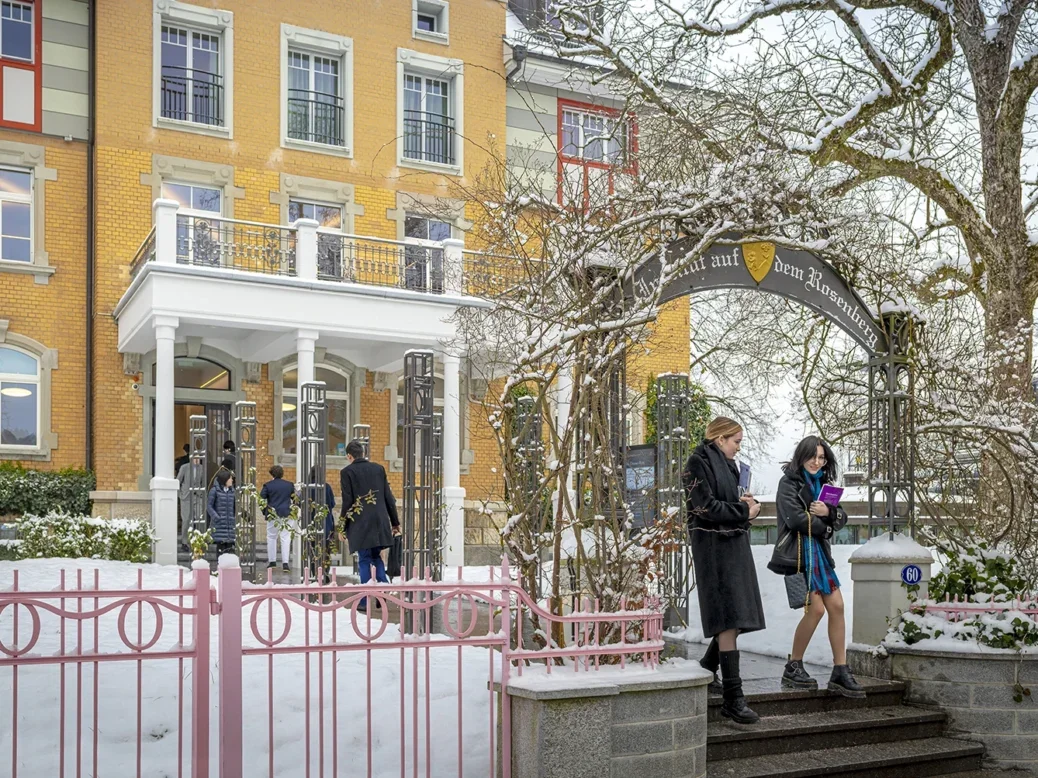
It is just after 8pm on a Thursday evening. In a glass-walled building, about 20 young people with different accents are forming huddles to discuss the best way to provide instructions to an AI. Representatives of a Danish design firm offer guidance and ask questions. In the centre of the room, a bearded man with a linen scarf artfully draped around his neck occasionally addresses everyone at once, reminding them to consider something that might later prove crucial.
It could be a scene from the office of any multinational company in New York, London, Paris or Singapore. But in fact we are on the outskirts of the small Swiss town of St Gallen, on a snow-covered school campus full of pointy-roofed buildings that could have come from the imagination of Wes Anderson.
The school in question, Institut auf dem Rosenberg – or simply ‘Rosenberg’ as it’s usually known – often piques curiosity. Usually this is for one of two reasons. The first is its fees, which are upwards of $150,000 per year and, by many people’s reckoning, make it the most expensive in the world. The second is its approach to alumni.
Whereas the roll call of prime ministers to have attended Eton is common knowledge, and another top Swiss school, Le Rosey, is referred to as ‘the School of Kings’ thanks to its illustrious former students, much less is known about Rosenberg’s alumni. The school almost never reveals who they are.
But there is something else that the headmaster, or ‘director general’ as he is known, Bernhard Gademann, would like the outside world to understand. Since he took over in 2016, he and his team have been creating an environment designed to foster the entrepreneurs of tomorrow – and to address some of the problems that have polluted mainstream attitudes and approaches to education.
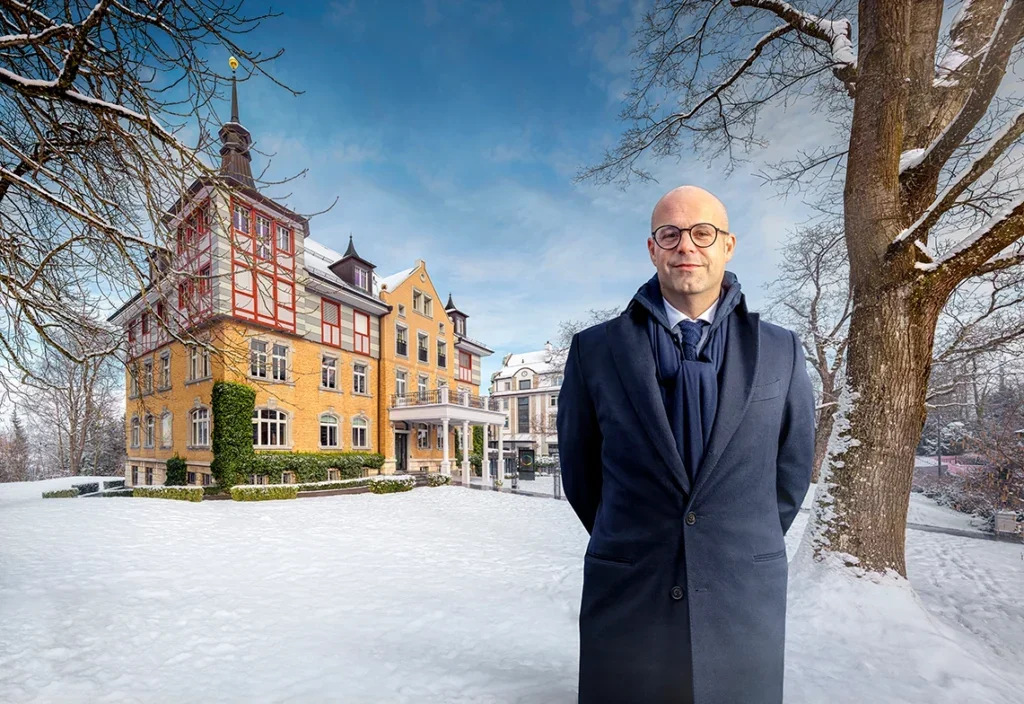
When Gademann speaks with Spear’s in an elegant meeting room, he offers a short account of some of the forces that have shaped the way schools and schooling have developed in the Western world – from military influence to the structures of the industrial revolution.
‘But somewhere down the line,’ he says, ‘it stopped developing. And I believe this rift between education and the real world is not only massive, but it also keeps growing every day.’
With his round spectacles, tasteful tailoring, excellent English (spoken in a mittel-European accent) and animated, somewhat evangelical style, Gademann seems like a cross between the principal of a family office, an art fair attendee, a marketing executive and a tech entrepreneur – which, in a way, he is.
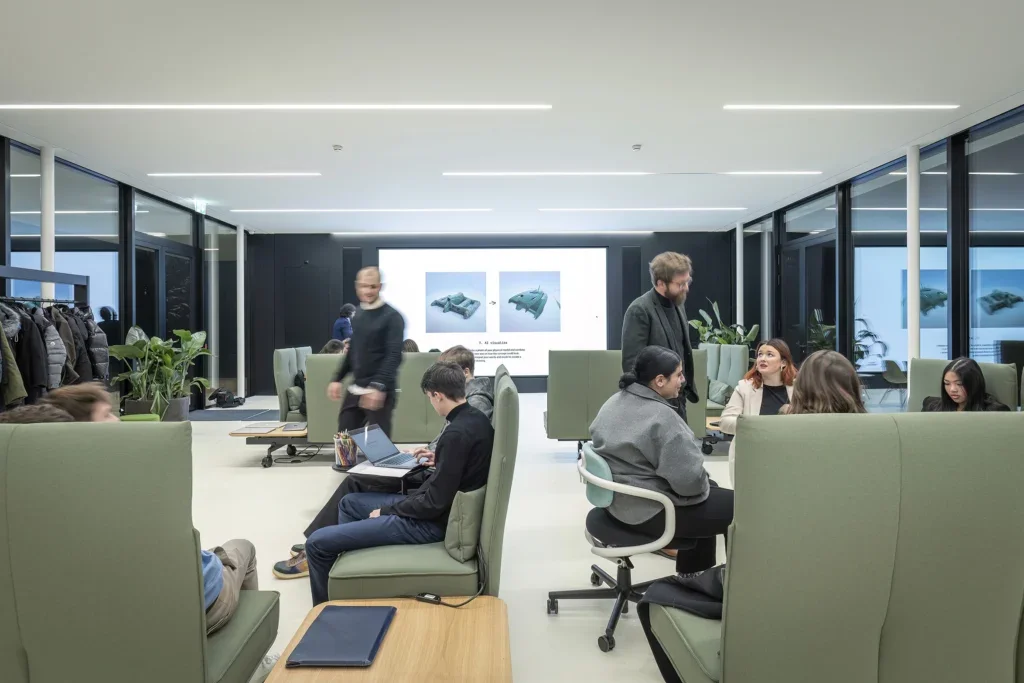
This is the third time I have met him. The first was at Mark’s Club in Mayfair, the second at the Rose Ball, a charity event in Monaco attended by Prince Albert.
And, judging by the school’s Instagram feed, which pictures Gademann wearing a suit, T-shirt and white trainers (sans socks) while speaking on a panel at Art Basel Miami, it is not unusual for him to spend time in the milieu of his students’ parents.
‘If we say we want the world of today, here in the school, there’s no point in sitting in an office and not getting out there.’ But, he adds, glancing down at his phone, ‘In my mind, I’m always here.’
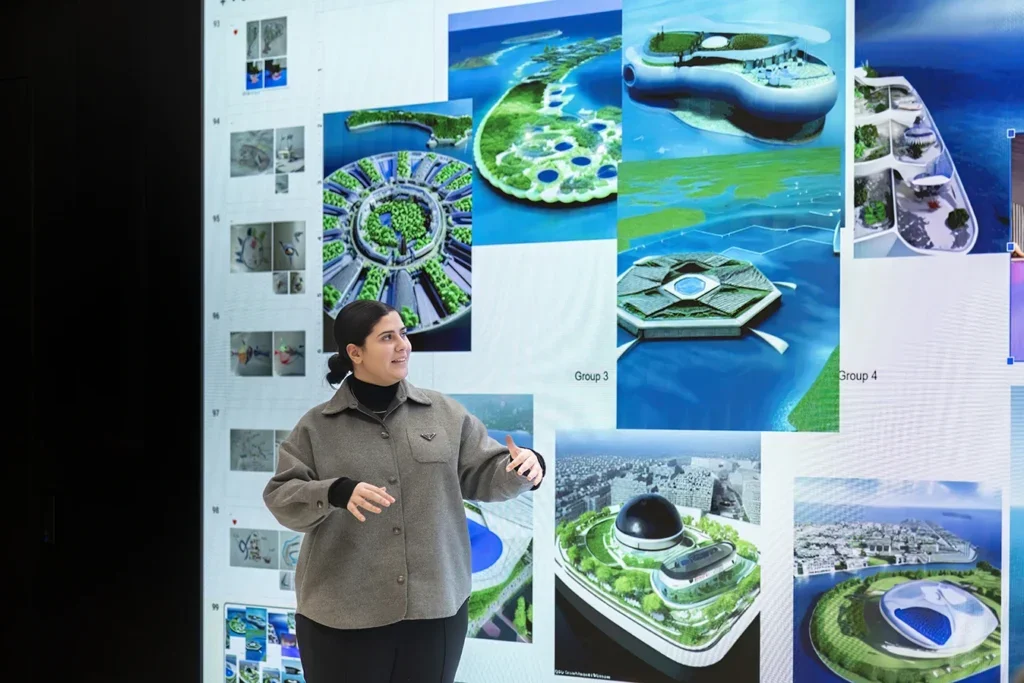
Gademann is the fourth generation of his family to have run the school after the Gademanns acquired it in the 1930s following the death of the founder, Ulrich Schmidt.
He attended Rosenberg as a child and met his wife Anita there when they were both students. Next year both the couple’s children will be enrolled. But it wasn’t always clear that he would take over.
In 2009, while he was working in London at ratings agency Fitch, his father died unexpectedly. ‘We had to figure out, with my family, how we were going to organise things,’ he says. ‘Once it became clear, I moved back here.’
‘We wanted to create a school that we would have liked to attend ourselves’
He returned to Rosenberg and joined the school’s board, but he only took day-to-day control in 2016. At the same time, Anita became head of innovation. By the time the couple took over, they had a good idea of what they wanted to do.
‘The vision was clear,’ says Gademann. ‘We wanted to create a school that we would have liked to attend ourselves as students. When we were at Rosenberg, there were things we absolutely loved and we thought they deserved to be preserved.
At the same time, we knew that it was now 15, 20 years later. So, [we asked ourselves] what was going to be the approach for the next generation? What are the types of skills they would have to learn? And what would that experience look like? So we had this unique privilege, I guess, to dream up what we consider to be the perfect school.’
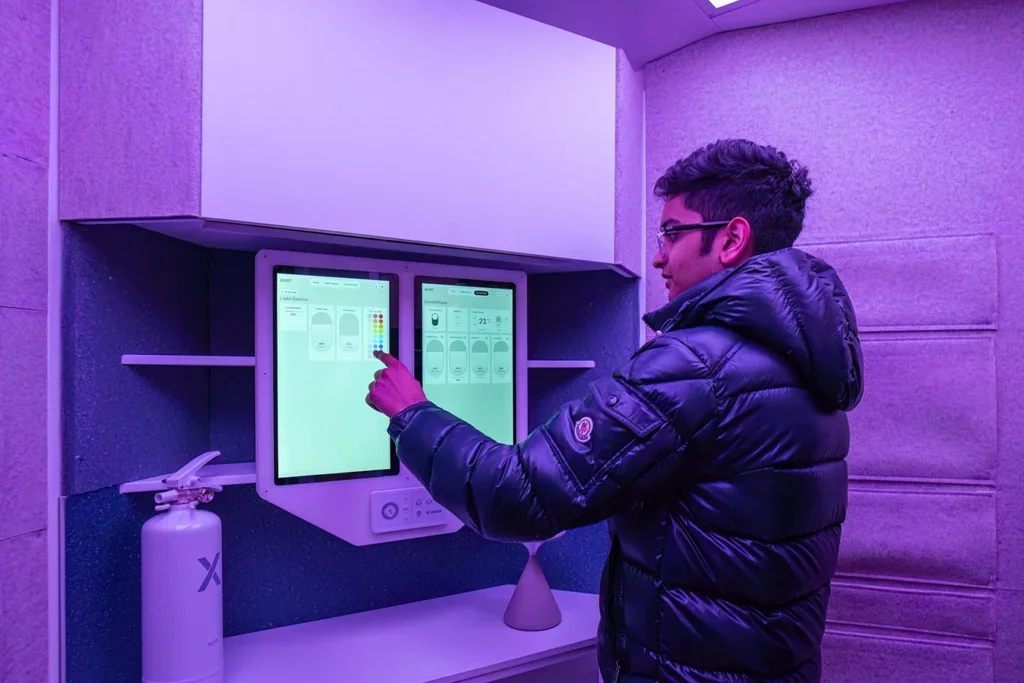
Part of the Gademanns’ approach was to create a system that would allow students to have an almost entirely personalised educational experience.
This begins with an ‘individual development plan’ (IDP), which is drawn up based on students’ hopes, interests and strengths. ‘We set a goal together, and then we work backwards. We say, “This is where we want to be in two or three years.” I think that’s something extremely empowering. So when you sit in a class, you know you’re working on a plan as part of your project – your vision for your future.’
To build this plan, the school’s 230 pupils aged 5-19 have 600 different courses to choose from. Lessons are generally taught in English, although Rosenberg says it teaches 47 other languages, and it is not uncommon for a gifted student in grade nine, for example, to be studying a subject like maths alongside students in grade 12.
Institut auf dem Rosenberg head: ‘Traditional education has completely lost the plot’
I mention that I know Gademann has misgivings about the way many schools gear so much of what they do around exams. ‘So,’ he says, taking a deep breath, ‘this is one of the things where traditional education has completely lost the plot, in my opinion. Over time, the exam prep became the curriculum. And the moment that happens, you can no longer talk about “education”; it [should be] called “exam preparation”.’
The Rosenberg way, he says, is to focus on the subject matter first and teach it via the proprietary Rosenberg International Curriculum. ‘We cannot avoid standardised exams, you know,’ he says. ‘We understand this is how the world works, at least for the foreseeable future… We want our students to go into excellent universities.’
So time is set aside for pure exam preparation, which is tailored to the relevant examination type and exam board.
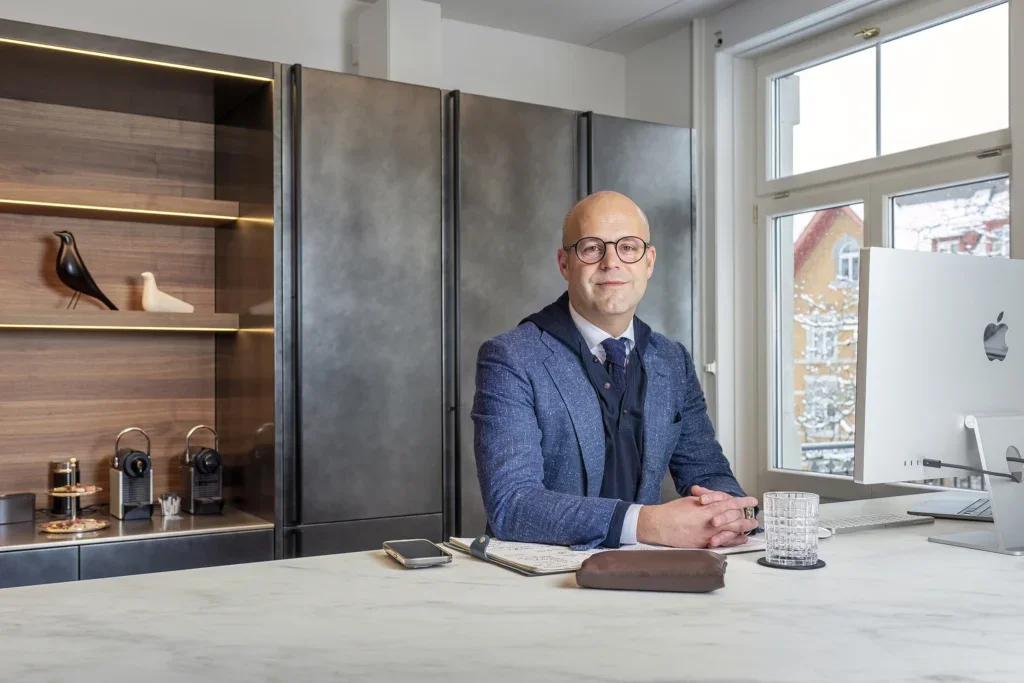
[See also: Spear’s selects the best private schools in the world]
‘Most parents don’t care about the cost’
For most schools it would be impossible to offer such a range of subjects and qualifications, but at Rosenberg the process is facilitated by the school’s own computer system, which uses an algorithm to build students’ timetables.
Of course, having a student:teacher ratio of 2:1 (and an average class size of eight) doesn’t hurt either. What’s more, these are not just any teachers but ‘artisans of education’, to use Rosenberg parlance. ‘They’re the luxury in the classroom,’ notes Gademann, riffing again on the implications of technology. ‘In a world where an online AI-based teaching model can do the same job for $1 a month. Yeah, what’s our value?’
Rosenberg’s approach is, of course, made possible by its outsized fees. In characteristically Swiss style it responds to direct questions about what these actually are with a degree of obfuscation, preferring to say there is a base fee of CHF93,000 (£82,000), which includes ‘regular academic tuition, all regular school meals, non-chargeable co-curricular and athletics courses as well as our ground-breaking IDP guidance’.
The school advises that parents budget for an additional CHF57,000 (£50,000) if their children are to enjoy the full Rosenberg experience, which includes trips and access to the special ‘co-curricular’ programmes. ‘Most parents don’t care about the cost,’ one member of staff tells me. ‘They care if we deliver what we promise. It’s an investment.’
For parents hoping to secure a place for their child at Rosenberg, ‘I would say the best approach is to be authentic,’ says Gademann, who says about one in four applicants is admitted. ‘We get applications that look so polished. I’m not saying we outright dismiss them, but if it’s too polished then it’s probably not real. We would like to see the real candidate and understand who they are as a person.’
How does the Rosenberg culture differ from other Swiss boarding schools, such as Le Rosey? ‘It’s really apples and pears,’ says Gademann. ‘I would say our approach is uniquely forward-looking, future-orientated, very, very holistic… A good example is we don’t publish the names of the alums.
‘Because we think it doesn’t matter who your parents are, or you know, who studied here or not. That’s irrelevant. What’s important is your story, and what you’re doing today.’

[See also: What’s behind the rise of branded schools?]
‘Showing off is for losers’
Money and privilege are certainly not topics that Rosenberg shies away from, however. Gademann himself teaches a course on ‘wealth creation and investment’ which covers stock markets and trading strategies. ‘That’s one of those topics that nobody ever talks to you about,’ he says. ‘But by the time you’re 25, if you don’t know it, you’re considered a failure.’
In one of the corridors there is a poster that displays the figure ‘0.045 per cent’ in a large font. Below, an explanatory note reads: ‘percentage of the world population that can afford to study at your school’. At the top of the poster the words ‘privilege’ and ‘responsibility’ encircle a slogan: ‘OWN IT!’
‘This is the key point, and maybe also the key to our culture here at Rosenberg,’ says Gademann. ‘The moment you realise that you’re privileged, this is the moment you start owning your life. If you feel that you have a disadvantageous position and you obsess over it, you’ll never move forward. I also tell new students, “Remember this: anybody showing off with their parents’ money? Those people are losers.” It’s as simple as that.’
Obeying the code at Institut auf dem Rosenberg
Indeed, during my day on campus the students are more polite and deferential than I had expected the sons and daughters of the world’s billionaire elite to be.
There is not a ‘uniform’ as such, but there is a dress code. While girls seem to wear more or less what they please, the boys are all in what might be described as ‘business-casual’ – most opt for a dark suit, which, on this winter’s day, is often worn with a turtleneck and a pair of leather loafers or suede Loro Piana Open Walks.
When we sit down to lunch in the school dining room – which is decorated with both a bust of a member of the Gademann family and a pink neon sign that reads ‘This is our time’ – kids of different ages come up to one another and say hello or hug and then stand by their chairs.
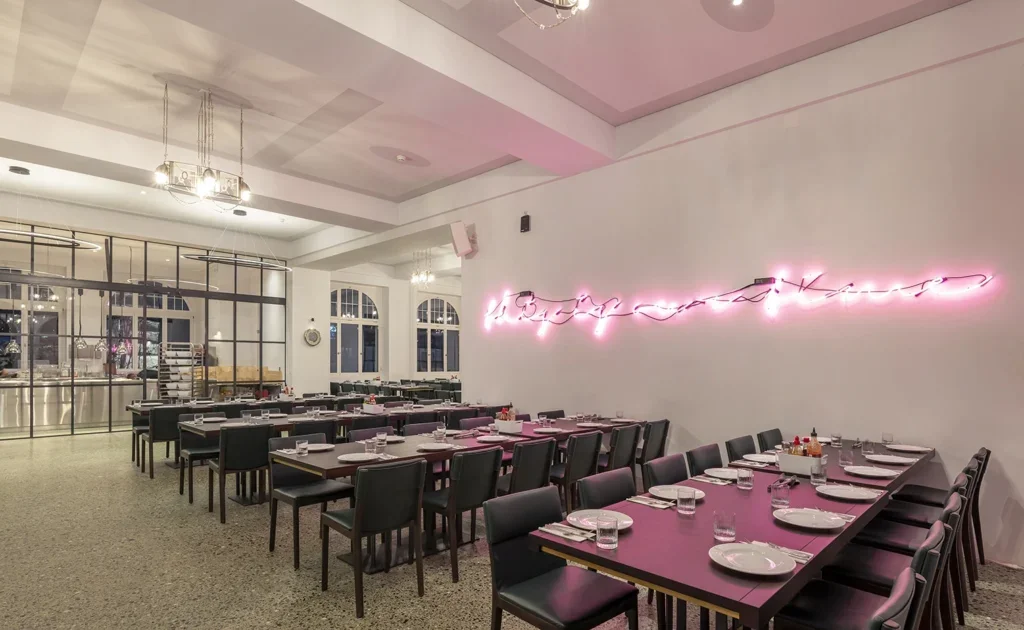
A bell sounds and the girls sit. A second bell sounds and the boys sit. No one needs to be reminded of the rule that mobile phones are not allowed at the table. The food is the work of a team led by a chef who used to work on the Lady Moura superyacht.
The school campus is home to 14 ‘villas’ across 25 acres, which generally house classrooms on the lower floors and boarding accommodation (all students are boarders) on the upper floors. The boarders’ rooms, many of which are double and en suite, have cherrywood floors, and loos skirted in marble.
But in this environment, where wealth serves as the ultimate leveller, students can lose privileges if they misbehave. ‘We’re not necessarily a strict school,’ says Gademann. ‘But we’re a very consequent school. So we have a set of rules, known as the Rosenberg code. Our students know it very well.’
Pupils receive ‘instant feedback’, which can be either positive or negative, both in person and via the school’s own app, into which the school’s code and an algorithmic system of warnings and escalations has been programmed.
Good behaviour can be rewarded, while bad behaviour may lead to certain privileges – such as ‘later bedtime, going to town, being allowed to order takeaway at the weekend, being allowed to travel home on certain weekends’ – being revoked.
‘We believe anybody can make a mistake,’ says Gademann. ‘Do not make the same mistake twice.’ Few transgressions would lead to immediate expulsion, but among them are serious physical or psychological aggression and drugs, which is ‘something we test [for] regularly’.
Institut auf dem Rosenberg’s first-class facilities
To say that Rosenberg has some impressive facilities would be an understatement.
One part of the campus, the ‘future park’, is home to three particularly interesting structures. The first is a tree-like wind turbine, which provides the electricity that powers the school’s three brightly coloured Audi e-tron 4x4s (the greeny-blue one is called Greta).
The second is essentially a greenhouse, which comprises a pair of geodesic domes; one is always 3 degrees warmer than the other, to enable the students to observe how the kind of temperature differential that may be brought about by man-made climate change can affect the environment.
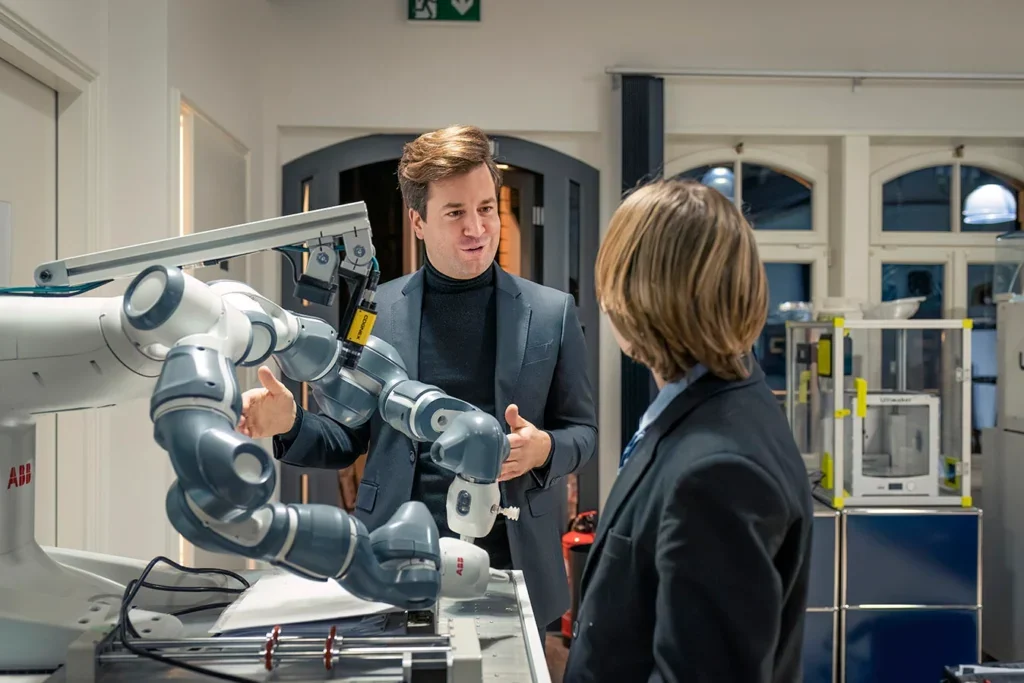
The third is the newest and perhaps the most impressive; it is the tallest 3D-printed polymer structure in the world, created in partnership with Saga, a Danish architecture and design company. (The school also has partnerships with Boston Dynamics, which has provided a version of its dog-like robot Spot, and Foster + Partners.)
The purpose of the 3D-printed structure is to serve as an environment for ‘experiential learning’, with students considering a scenario in which the two-storey pod is used as a space ‘habitat’.
Once I have entered through the airlock and climbed the ladder to the upper deck, a student – who has won a place to study economics at Warwick but is still holding out for the University of Chicago – explains that he and his fellow pupils have contributed to the design of the interior, selecting appropriate materials and equipment (such as speakers and lighting to improve mood) to maximise quality of life in the confined living quarters. As part of the project, pairs of students will try living in the pod for 48 hours.
Later, after any normal school day would have ended, I sit in on the AI session with some of the other older students. It is part of an entirely voluntary ‘co-curricular’ course, another initiative run with the help of Saga, and has been marketed in the school grounds with stylish, professional-looking advertisements.
During the class some of the students are completely engaged, while others are less so. One has an Apple airpod in one ear. Of course, this is not a ‘lesson’ in the traditional sense, but the school’s ethos of freedom and personalisation is in evidence.
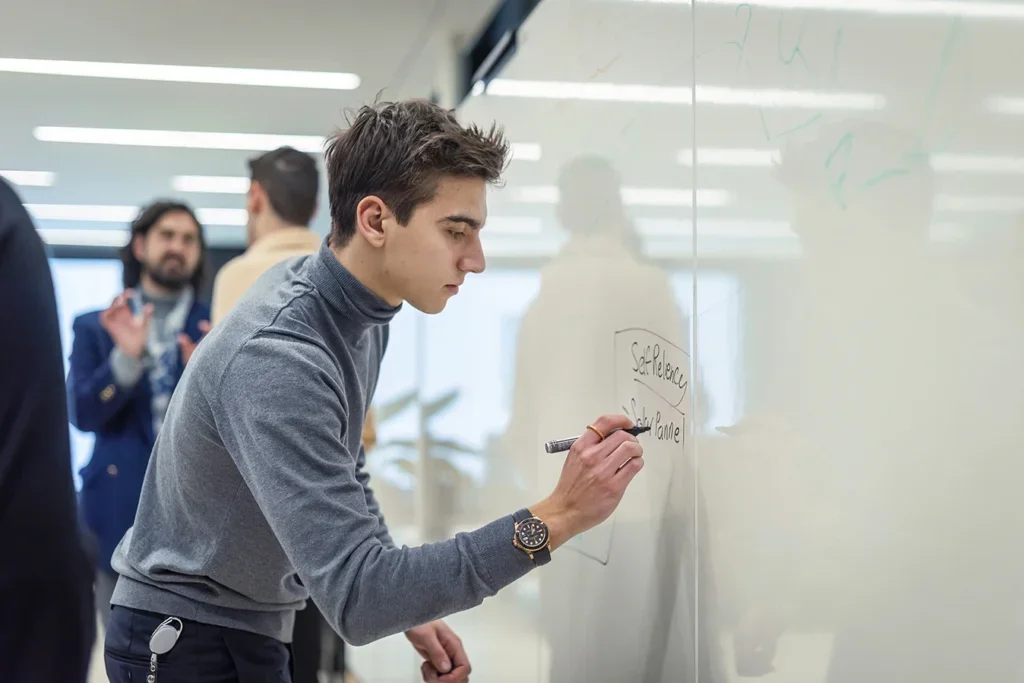
My own impression is that this could be incredibly effective for a highly motivated student, who would be empowered to do and discover whatever they wanted. It may also be a helpful environment for a child who is not ‘academic’ in the traditional sense, who might feel alienated by the kind of regimented, less compromising approach that many top British schools would take.
But I find myself wondering whether a middling-to-good child who simply needed a firm hand and a bit of guidance to achieve their potential would find that here.
The school is coy about its academic results. In an emailed statement it told Spear’s: ‘We do not participate in league tables or rankings as we don’t believe that exams are a good indicator of academic or personal success.’ It added that the school’s small cohorts ‘are not large enough for league tables’; sometimes only five to 10 students take IBs in a single year.
It does publish some results, however. In 2022, Rosenberg revealed that 90 per cent of its students’ AS and A2 grades were A*, A or B (with a 100 per cent pass rate). In 2021 its IB students scored an average of 38 points. The school also occasionally posts on social media when a student has achieved the highest mark in Switzerland for a given subject.
Once the discussions and planning in the AI session have come to an end, it is time for the students to assemble at the video wall at the front of the class and present their designs, which are for a floating habitat that could be developed for a sort of post-apocalyptic Waterworld-style environment. They have been created by the AI-powered image creation platform DALL·E, based on the students’ inputs, and much of the analysis centres around how to hone these inputs to generate the desired outcome.
When they speak, the students are a mix of quiet and shy, loud and extroverted. The girls generally talk quietly and fairly seriously, while the boys embrace the humour of strange outputs from the AI.
In short, they are like teenagers the world over – except they wear Prada tops or gold Rolex Submariners – and have the means to turn their AI-powered dreams into reality.






